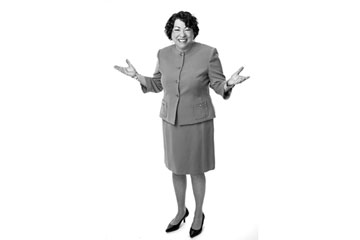
My Beloved World is very personal. Why did you write it?
I realized that people had an unreal image of me, that somehow I was a god on Mount Olympus. I decided that if I were going to make use of my role as a Supreme Court Justice, it would be to inspire people to realize that first, I was just like them, and second, if I could do it, so could they.
Become a Supreme Court Justice? But how realistic is that?
The odds are extraordinary — even worse than hitting the lottery. But the message of the book is really about dreaming and working toward dreams by taking it step by step. It's the journey that's the aim.
Is it true that your admission interview at Radcliffe was the first time you'd seen a couch without plastic on it?
Yes. In the world I grew up in, if you were poor and had a bunch of kids in the house, which everybody did, nothing you bought was ever going to stay pure, and the only way to do it was to put plastic on it and protect it. [Years later] as a prosecutor I had to talk to a witness in the projects, and there was plastic on the couch, and as we're talking, a cockroach walked up the stem of the lamp. I had to wrap up what I was doing quickly and run out. It was a moment of realizing how far I had come and how far I had not come.
You were so restless as a child, your nickname was Aji, "hot pepper." Why pick a profession that requires sitting and listening to long arguments?
When I am concentrating, I can be fixed in place for hours. In fact, there was a joke in my office that everybody would come and chat outside my door because they knew no matter how loud they talked, if I was concentrating, it would not disturb me at all.
Your grandmother used to conduct séances and wanted you to be a mystic. Do you regret that your mother put the kibosh on that?
Absolutely not. I don't meddle with what I don't understand, and I don't question other people's beliefs.
You say you knew as a child that your father, who died of alcohol-related causes, was the only one responsible for his drinking. You don't agree that addiction is a disease?
As with all illnesses, you've got to pay attention to it to cure it. I think that you're responsible for the choice [to seek help].
You cite yourself as an example of how affirmative action worked. Is it working today?
There's a case before the court, so I'm not going to talk about today. I can talk about a more general feeling. I don't think we're ever going to reach complete equality unless both employers and everyone else are sensitive to the fact that it is a valuable goal for society.
You say you're optimistic about finding a partner. Do men find the Supreme Court thing intimidating?
I expect many will. He's going to have to be a very special man. I'd like a partner, but if I don't get one, I'm not going to be unhappy.
What have you learned from being on the court?
How difficult the job is. We're all very persuasive advocates. We write [decisions] in a way that minimizes the difficulty of the counterargument.
In your legal opinion: Mariano Rivera — best pitcher ever or just best closer ever?
This is a decision I can't render without qualifying it by saying I have no objectivity in this matter. You can't do what he does as a closer unless you have full command of your pitches. His command far exceeds anyone else's. To me, he's the best pitcher ever.
